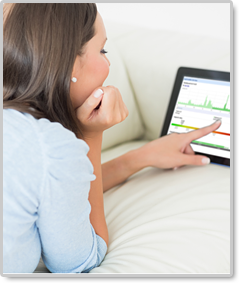Creating a Smarter Home
 There are
new web apps and devices coming out that can help you save energy,
improve safety and increase the convenience of your home by making your
home “smarter.” “Smart home” is a term that is used for describing web
apps, devices, and systems that automate your home to make managing
your home easier and better.
There are
new web apps and devices coming out that can help you save energy,
improve safety and increase the convenience of your home by making your
home “smarter.” “Smart home” is a term that is used for describing web
apps, devices, and systems that automate your home to make managing
your home easier and better.
Some elements of smart home apply to individual appliances, and others
apply to whole house systems. And some involve improved monitoring, and
some involve improved control. It is easy to get confused, so in this
article we will go through how various smart home innovations can help
you with the following aspects of your home:
- Electricity Use
- Energy Pricing
- Temperature Control
- Flood & Water Alerts
- Sump Pump Performance
- Humidity
- Home Security
- Lighting
- Appliances
- Home Entertainment Systems
ELECTRICITY USE
There is an old expression that “what gets measured, gets managed.” So
if you are unhappy with the size of your monthly bills for your home’s
electricity use, then one of the key steps to better manage your home’s
energy use, is to better measure how you are using electricity around
your home, so that you can understand what changes you should make. And
hopefully these insights will also help further motivate you to
complete the energy-saving tasks in the monthly personalized reminders
that you get from Home-Wizard.com!
There are some fairly inexpensive energy monitoring devices which you can get, that will show you what the energy use is for individual appliances around your home. Examples of these include: Kill-A-Watt Usage Monitor and Watts Up Power Meter.
These kinds of devices can help you identify the energy hogs in your
home, that you will want to avoid using. You just plug in each
appliance into one of these devices, and it which will display how much
power it is using.
In addition to devices that measure electricity usage of individual
appliances, there are other new energy monitoring devices which measure
the energy use of your entire home. Examples of these whole-house electricity monitoring devices include:
Black & Decker Power Monitor
The device has an optical sensor that you place on the outside of your electric meter, and it sends a radio signal to a desktop device in your home, which displays your on-going energy usage and cost.
Energy Hub
in addition to allowing you to see whole-house energy use, it can control appliances, etc. Works with utility smart meters, or an add-on device to measure.
Tendril
has partnered with utilities across the country. Can be integrated to control thermostats, appliances, etc.
The Energy Detective
displays total energy use in your home.
By using these web apps and devices, you can gain insights which are
reported to save you 5-15% on your energy bill. These insights can
include:
- Where do you have vampire power appliances, which suck electricity even when they are turned off?
- Are there time periods that you should try to avoid electricity use, because your local utility has tiered pricing?
- Do you have appliances that are stuck in the “on” position, and are continually drawing power?
- Do you have appliances which appear to be drawing excessive current amounts?
- Is the billing information from your local utility correct?
ENERGY PRICING
In addition to knowing how much energy you are using, it is also helpful to know what are your pricing options.
Electricity
: More utilities are beginning to have “time of use” pricing, which means that during their peak usage periods, they charge more for electricity. In some cases, the utility can be charging 5 times higher rates in peak periods. The purpose is to get their customers to reduce consumption during these peak periods, when it is most costly to meet demands (and typically requires the use of their most environmentally un-friendly power generating facilities). You will want to check your local utility’s website to confirm their time of use pricing, so that you are aware of their peak periods, and how much your pricing goes up during these times. That way you can avoid using your appliances (dishwashers, dryers, air conditioning, etc. during these times).
Recent Posts
-
Integrating Smart Cooktops into Your Home Automation System
Introduction to smart cooktopsSmart cooktops are a modern kitchen appliance that can be in …Apr 6th 2024 -
The Ultimate Checklist for Setting Up an Efficient Home Office Space
Assessing your workspace needsTo create an efficient home office, start by evaluating the space you …Mar 29th 2024 -
Save on Energy Bills: Tips for Efficient Outdoor Lighting
Importance of efficient outdoor lightingOutdoor lighting plays a crucial role in enhancing the safet …Mar 17th 2024





